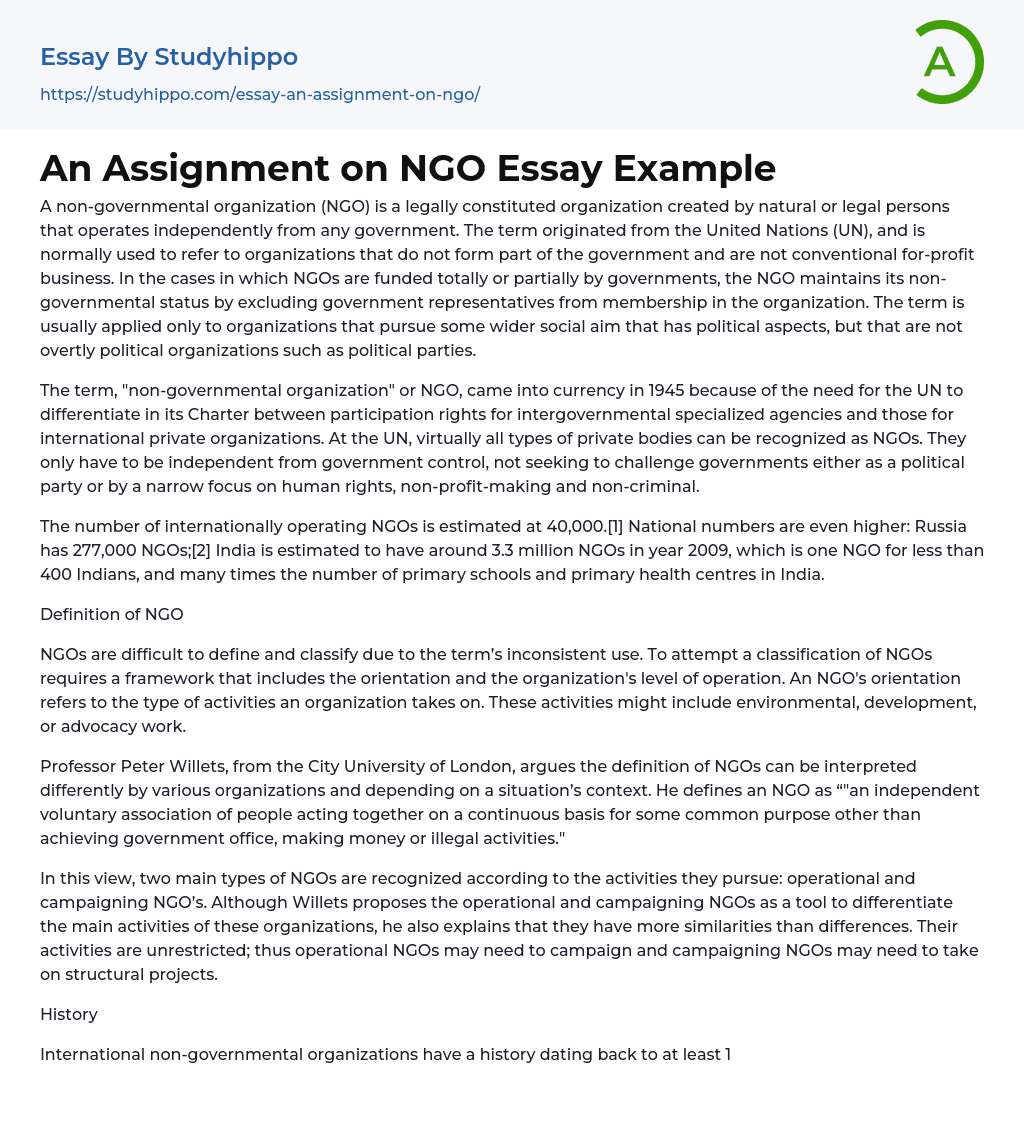A non-governmental organization (NGO) is a legally constituted organization created by natural or legal persons that operates independently from any government. The term originated from the United Nations (UN), and is normally used to refer to organizations that do not form part of the government and are not conventional for-profit business. In the cases in which NGOs are funded totally or partially by governments, the NGO maintains its non-governmental status by excluding government representatives from membership in the organization. The term is usually applied only to organizations that pursue some wider social aim that has political aspects, but that are not overtly political organizations such as political parties.
The term, "non-governmental organization" or NGO, came into currency in 1945 because of the need for the UN to differentiate in its Charter between participation rights f
...or intergovernmental specialized agencies and those for international private organizations. At the UN, virtually all types of private bodies can be recognized as NGOs. They only have to be independent from government control, not seeking to challenge governments either as a political party or by a narrow focus on human rights, non-profit-making and non-criminal.
The number of internationally operating NGOs is estimated at 40,000.[1] National numbers are even higher: Russia has 277,000 NGOs;[2] India is estimated to have around 3.3 million NGOs in year 2009, which is one NGO for less than 400 Indians, and many times the number of primary schools and primary health centres in India.
Definition of NGO
NGOs are difficult to define and classify due to the term’s inconsistent use. To attempt a classification of NGOs requires a framework that includes
the orientation and the organization's level of operation. An NGO's orientation refers to the type of activities an organization takes on. These activities might include environmental, development, or advocacy work.
Professor Peter Willets, from the City University of London, argues the definition of NGOs can be interpreted differently by various organizations and depending on a situation’s context. He defines an NGO as “"an independent voluntary association of people acting together on a continuous basis for some common purpose other than achieving government office, making money or illegal activities."
In this view, two main types of NGOs are recognized according to the activities they pursue: operational and campaigning NGO’s. Although Willets proposes the operational and campaigning NGOs as a tool to differentiate the main activities of these organizations, he also explains that they have more similarities than differences. Their activities are unrestricted; thus operational NGOs may need to campaign and campaigning NGOs may need to take on structural projects.
History
International non-governmental organizations have a history dating back to at least 1839. It has been estimated that by 1914, there were 1083 NGOs. International NGOs were important in the anti-slavery movement and the movement for women's suffrage, and reached a peak at the time of the World Disarmament Conference.[14] However, the phrase "non-governmental organization" only came into popular use with the establishment of the United Nations Organization in 1945 with provisions in Article 71 of Chapter 10 of the United Nations Charter for a consultative role for organizations which are neither governments nor member states—see Consultative Status. The definition of "international NGO" (INGO) is first given in resolution 288 (X) of ECOSOC
on February 27, 1950: it is defined as "any international organization that is not founded by an international treaty". The vital role of NGOs and other "major groups" in sustainable development was recognized in Chapter 27 of Agenda 21, leading to intense arrangements for a consultative relationship between the United Nations and non-governmental organizations.
Rapid development of the non-governmental sector occurred in western countries as a result of the processes of restructuring of the welfare state. Further globalization of that process occurred after the fall of the communist system and was an important part of the Washington consensus.
Globalization during the 20th century gave rise to the importance of NGOs. Many problems could not be solved within a nation. International treaties and international organizations such as the World Trade Organization were centred mainly on the interests of capitalist enterprises. In an attempt to counterbalance this trend, NGOs have developed to emphasize humanitarian issues, developmental aid and sustainable development.
- Federal government essays
- Armed Forces essays
- Confederate States Of America essays
- Federal Government Of The United States essays
- Fourteenth Amendment To The United States Constitution essays
- Governance essays
- Parliament essays
- Politics essays
- Jurisdiction essays
- Bureaucracy essays
- Separation Of Powers essays
- Congress essays
- President essays
- United States Congress essays
- Non-Commissioned Officer essays
- Appeal essays
- Revenge essays
- Corporate Governance essays
- Public Service essays
- Income Tax essays
- Supply essays
- Red Cross essays
- Democracy essays
- State essays
- Liberty essays
- Absolutism essays
- Reform essays
- Republic essays
- John Marshall essays
- Bourgeoisie essays
- Developed Country essays
- Elections essays
- International Relations essays
- Left-Wing Politics essays
- Monarchy essays
- Political Corruption essays
- Political Party essays
- Political Science essays
- Sovereign State essays
- United Nations essays
- World Trade Organization essays
- Contras essays
- Dictatorship essays
- Foreign policy essays
- Monarch essays
- Corruption essays
- Foreign essays
- Democratic Party essays
- European Union essays
- President Of The United States essays




